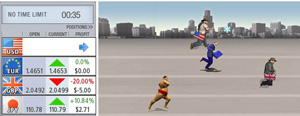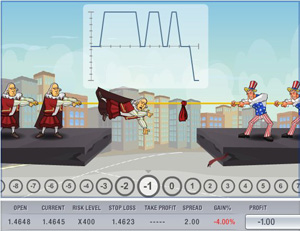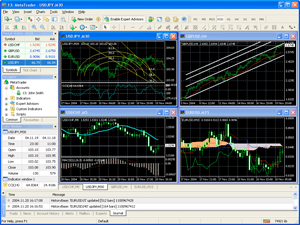Israeli eToro is taking a novel approach in simplifying Foreign Exchange (Forex) trading by packaging the complicated concepts involved in trading one currency against another, in fun non-threatening wrappers.
Just how big is Forex trading? Try an estimated $3.2 trillion in daily turnover—that’s ~35 times the average turnover of the NYSE. However, unlike stock trading which has been generally adopted by the mainstream, Forex trading to date has been mostly marginalized to professional traders. eToro wants to change all that.
I spoke to eToro’s CEO, Johnathan Assia, who explained that the real challenge for eToro is finding ways to present Forex data in a simplified and user-friendly manner that makes it accessible to ordinary users. To appreciate the challenge, take a look at the screenshot on the right depicting a typical Forex trading app interface. Now take a look at the screenshots below of eToro’s offering. Talk about a picture being worth a 1000 US Dollars Vs. the Japanese Yen…
Requiring a client download, eToro lets users practice play, or deposit funds for real money trading. The currencies available to trade are the US Dollar, British Pound, Australian Dollar, the Euro and the Japanese Yen. This is where it gets fun… There are four games to choose from:
- Forex Marathon – You pick the currency you think will go up and have it compete in a foot race against the currencies you think will go down.

- Dollar Trend – Race the US Dollar against other currencies, choosing whether it will rise or fall.
- Globe Trader – Manage your Forex trading portfolio by forging relations with other currencies on the map of the world.
- Forex Match – Choose the currency you think will go up and have it go one-on-one in a tug of rope against a currency you think will go down.

I was supplied with a real money account by eToro and managed to lose $17 in an hour’s-worth of play =(
When a user registers for a real money account, that account is actually opened at one of two foreign exchange trading brokers, RetailFX or IFX Markets. eToro decides which broker based on where it expects to make the most commissions on trades the user makes.
The one thing I found odd about eToro is its rigid insistence on the lack of parallels when comparing it to online gaming operators. This is a rather naïve point-of-view for several reasons: First, one of the company’s co-founders and its CTO is David Ring who was a key R&D leader at Israeli-based 888.com (a major online casino and poker room operator). Second, eToro’s client application is strikingly similar to gambling apps, and this cannot be a pure coincidence. Third, eToro is a BVI company, (a.k.a., a British Virgin Islands company)—classic tax strategy by gambling operators. Fourth, the company’s affiliate marketing offering is extremely reminiscent of gaming operators, “Receive 25% of eToro’s Revenues or Get $2 per every free registered user.”
It’s important to note that will all the similarities, eToro is in fact not a gaming operator. Forex trading is not considered gambling and therefore does not fall under the scope of H.R. 4777, the Internet Gambling Prohibition Act.
In January 2007 eToro raised a first round of financing to the tune of $1.7M from by private investors. In an interesting side note, one of these investors is Chemi Peres, who heads Pitango Venture Capital and also happens to be the son of statesman and current president of Israel, Shimon Peres.

